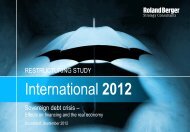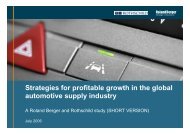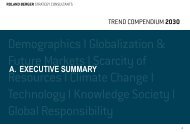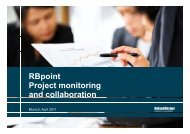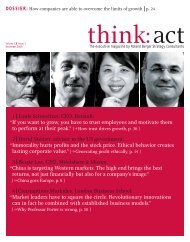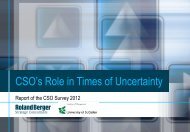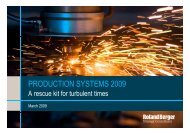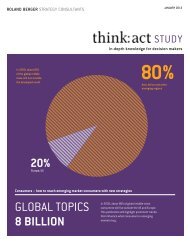Regarding procurement, less is more â sometimes - Roland Berger ...
Regarding procurement, less is more â sometimes - Roland Berger ...
Regarding procurement, less is more â sometimes - Roland Berger ...
You also want an ePaper? Increase the reach of your titles
YUMPU automatically turns print PDFs into web optimized ePapers that Google loves.
ROLAND BERGER STRATEGY CONSULTANTS<br />
ENVIRONMENTAL AND SOCIAL<br />
COMPATIBILITY BECOMES THE NORM<br />
More and <strong>more</strong> companies include sustainability<br />
measures in their supplier assessment<br />
appears to be "No". In an effort to shrink their own carbon footprint, both businesses moved<br />
earlier th<strong>is</strong> year to shun suppliers that source their fuels from Canada’s oil sands.<br />
It <strong>is</strong> prec<strong>is</strong>ely because their customers demand such action that companies can in turn<br />
demand <strong>more</strong> from their suppliers. Consumer goods and life sciences companies such as<br />
Procter & Gamble, Unilever, and Henkel are rewriting the rules for strategic partnerships<br />
to include sustainability measures. Automotive manufacturers, including Mercedes<br />
Benz/Daimler (Blue Tech) and Toyota (for its hybrid vehicles), have taken similar steps<br />
to force their raw materials contractors to live up to best practice standards.<br />
Similarly, purchasing companies are scrutinizing the anti-corruption standards of their<br />
providers, especially those operating in emerging economies. Value-based production has<br />
become a hallmark and a differentiating factor in the globalized economy, boosting the<br />
importance of corporate social responsibility. Dealers that fail to comply with a company’s<br />
CSR portfolio, or with any of the other measures cited above, will find it <strong>more</strong> difficult to<br />
secure strategic partnerships.<br />
METRO Group, one of the world’s biggest international retail companies, recently announced<br />
the creation of a "Sustainability Board", whose members will include the company’s CEO and<br />
COO. The efforts of Swed<strong>is</strong>h furniture giant IKEA are further advanced: The company’s outstanding<br />
CSR management was recently honored with a coveted “Fair Trade“ award in gold.<br />
PUTTING THE 'NATIONAL' IN STIMULUS<br />
ZOLL<br />
DOUANE<br />
IV. PROTECTIONISM REARS ITS UGLY HEAD<br />
Innovative arrangements between customers and suppliers, such as those mentioned above,<br />
need the support of a truly competitive natural resource market, one that <strong>is</strong> not dominated<br />
by monopol<strong>is</strong>tic behavior and beholden to financial speculation. Even after the cr<strong>is</strong><strong>is</strong>, which<br />
prompted a drop in demand for most natural resources, national<strong>is</strong>m continued unabated,<br />
negatively affecting trade in natural resources. Governments around the globe are becoming<br />
increasingly involved in trying to guarantee their nation’s supply of resources. Their methods<br />
may differ. For example, German companies have partnered with Gazprom, the Russian gas<br />
supplier, to build direct pipelines between the two countries, while the Chinese government<br />
has sent its national oil companies to buy oil fields in Africa and beyond. Either way, the goal<br />
<strong>is</strong> clear: To secure a nation’s supply of energy and other natural resources.<br />
Such measures are particularly prevalent in countries where resources have driven rapid<br />
economic growth in the past and now represent the best hope for a speedy recovery from<br />
the global downturn.<br />
China <strong>is</strong> not the only country throwing its weight behind its own companies. The economic<br />
cr<strong>is</strong><strong>is</strong> <strong>is</strong> having other deterring effects on competition. National economic stimulus packages,<br />
including the popular (and now extended) US “Cash for Clunkers” program and the country’s<br />
infrastructure packages, have “Buy American” (or ‘buy national’) clauses embedded in them.<br />
Though they do not completely rule out international project bids, the hope <strong>is</strong> that national<br />
champions will “help put our nation on the path of global success – even in a world with <strong>more</strong>



